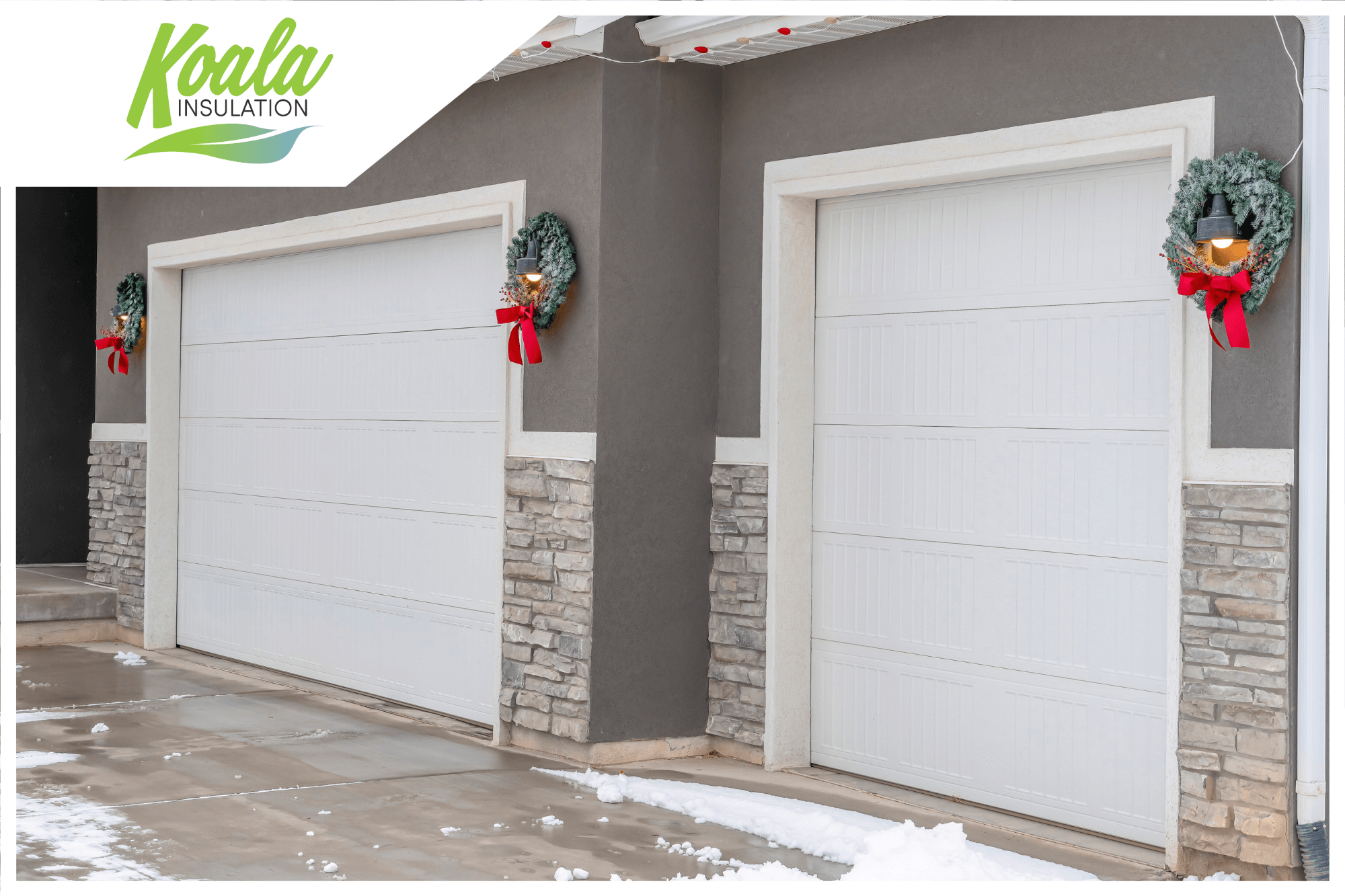Prepare Your Garage for Winter with Insulation

In order to keep your property safe and comfortable for the upcoming season, it’s important to develop a strategic winterization plan. One area you can’t overlook is your garage and storage sheds, as they often hold some of your most important equipment, vehicles, and more. Regardless of whether your garage is off to the side of the house or directly attached to your home with rooms above or below it, you need to take special care in developing a quality checklist.
For many climate zones, this should realistically be one of the first locations you focus on. With adequate preparation, this keeps your cars, lawn equipment, and other storage items safe. However, especially for garages that are attached to your home, preparation also helps to keep the house insulated from the cold. As such, Koala Insulation has developed a list of insulation tips and tricks to consider as you go through your winterization process.
5 Areas to Prepare in Your Garage for Winter
1. The Garage Door
Many homeowners understand the importance of regularly checking the condition of the garage door and mechanics within the system. Cracks, gaps, weathering, and other system issues should be taken care of before the first major storm hits to save you from worse damage. Not only are you more likely to find better deals and service assistance should you need it, but it also gives you a head start against incoming weather that could quickly damage any fixes you’ve made.
This also gives you an opportunity to check out the insulation and air sealing around the doors and openings. Ask yourself these questions while you go through your inspection:
- Does it sufficiently keep the cold air out?
- Are insects and rodents able to find their way in through small openings?
- Is there any moisture collection around openings or cracks?
After you’ve sealed problematic gaps and openings, make sure your mechanisms are well oiled, tightened, and running properly. One of the worst issues to run into is the garage door locking up in the middle of an incoming snow storm!
2. Exposed Pipes and Spigots
If you have water pipes running through your garage, it’s important to ensure they’re properly insulated/ Frozen and burst pipes affect unprepared homes every winter, with an average of 37% of frozen pipes occurring in underinsulated basements. Regardless of whether your garage is above a basement or off to the side of your home, a burst pipe can cause significant damage to the structure, plumbing, and property inside of the unit. This is especially important if you have any outdoor pipes and spigots; be sure they’re properly drained, prepared, and covered before the first frost sets in.
Consult an industry professional if you’re unfamiliar with what kind of pipes are running through your unit. Insulating your pipes randomly could cause more harm than good – if you add too much, you could risk a fire, and if you don’t apply enough you’re not providing enough protection. With an insulation expert, a team can guide you on the proper material type and amount to apply around your garage.
3. Air Leaks and Gaps
We mentioned briefly how important it is to inspect and seal any gaps and openings in your garage and storage units. Quality air sealing doesn’t only improve the indoor air quality of a space – it also prevents air pollutants and pests from easily making their way into the unit. One of the main benefits, though, is the ability to keep in desired heat. According to Energy Star, about 90% of U.S. homes have poor air sealing and insulation because of infrequent maintenance and deterioration.
The good news is that air sealing general gaps and cracks is considered an easy job. You can choose to turn this into a DIY project or call in local insulation experts. However, it’s possible for homeowners to miss smaller, hidden cracks throughout their homes that aren’t as easy to find. Doors and windows are your common air leakage culprits, but there are other openings in your building envelope that can cause problems. Holes from pipes and wiring, foundation or wall damage, and hiding spots from insects and rodents are the most common undetected places that are contributing to air leakage, poor indoor air quality, and irregular temperatures.
4. Insulation Material
Insulation is found throughout your home and garage, within the walls, ceilings, and even the floors if you’re above a basement or crawl space. It’s even more crucial to evaluate the material in your garage if it’s below another room or the attic. Updated insulation that’s properly installed can not only help with improved temperature regulation but the material can even help with noise reduction and moisture resistance.
Your local Koala Insulation team provides free evaluations to send in an expert that will provide a breakdown on the current condition of your home’s insulation. Our insulation technicians can give you information on poorly installed material, inadequate coverage, and any deterioration or damages. The evaluation also covers air sealing, taking care of two important steps within the winter preparation checklist.
5. Flooring and Crawl Spaces
One of the last places to evaluate – and an area that is often overlooked – is the floor and crawl spaces in and around your garage. It’s especially important to prepare if you plan on storing vehicles and large equipment inside. Not only can it better insulate the unit but it may also prevent salt damage from affecting the concrete. For many sealants, you’ll need to regularly wash the area to prevent wear and damages that increase the rate of deterioration of most sealant materials.
Start by thoroughly preparing the space beforehand. Make sure the floor is clean, free of debris and dust, and move large items out of the way. Once you have a majority of the space cleared, you can apply a product like epoxy to seal the flooring and provide a barrier between the surface and your equipment. Sealing the floor isn’t necessarily a required step in winterization but it’s a great option if you’re continuously bringing vehicles and equipment in and out of the space.
Contact Your Local Insulation Expert
Whether your garage is attached to your home or you have a disconnected unit or storage shed, it’s important to have a thorough winterization process to prepare the space for the upcoming cold. This process can take time and planning ahead of the weather can ensure your property is safe and well-maintained throughout the season. While many of these steps can be done by you or a trusted friend, it’s a good idea to contact a local team to evaluate your area and provide tips and education on your home’s insulation condition. At Koala Insulation, we prepare our technicians with the necessary equipment and training to bring comfort and safety to their local areas. They’re prepared and ready to not only turn your home into a temperature-regulated safe haven during the winter but also teach you and your household about the importance of insulation throughout the year. Find your local Koala Insulation team today to schedule a free evaluation and learn more about your home’s material and improvement opportunities.
Find Your Location


Get a quote


